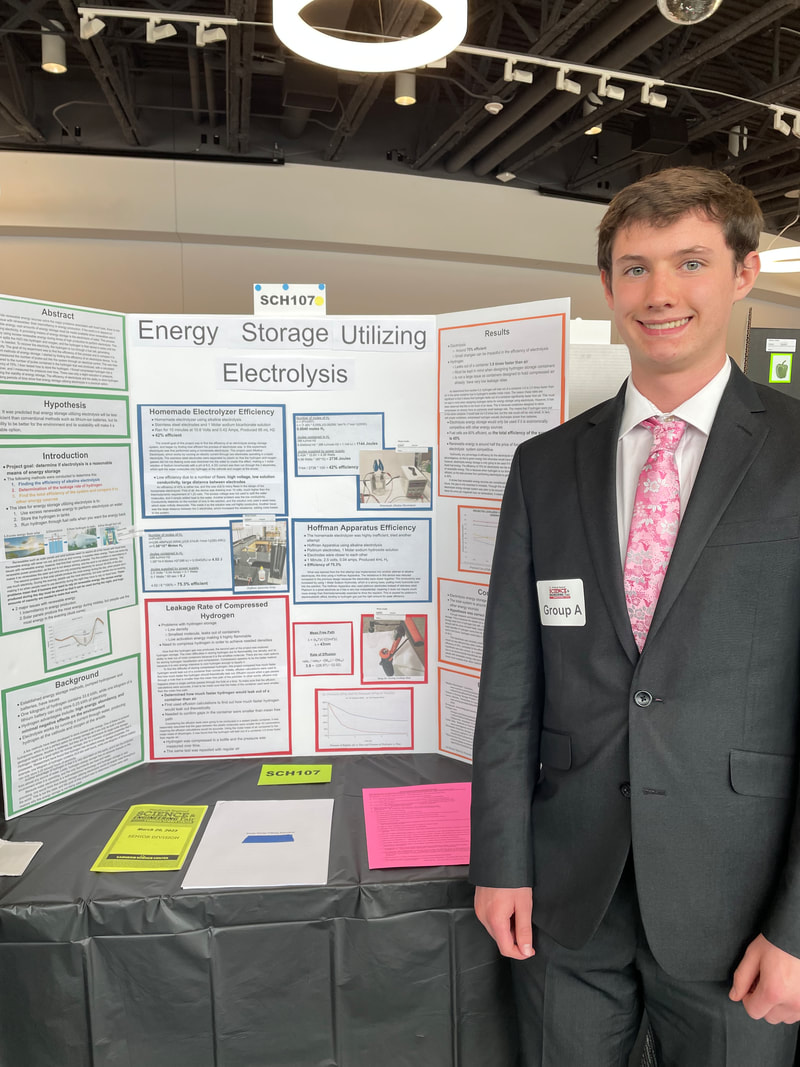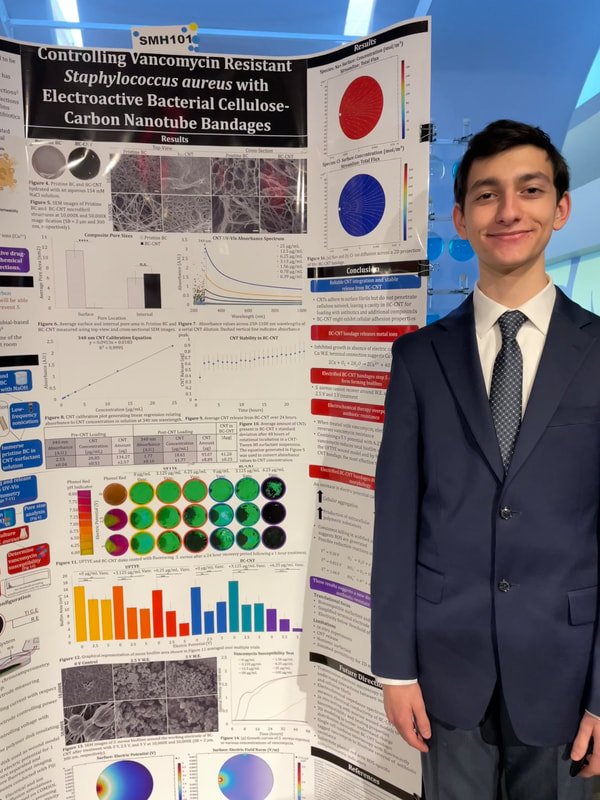| Aidan Hall, Mt. Lebanon Sr. High School Energy Storage Utilizing Electrolysis Aidan’s teacher is Kyle Tilger While renewable energy sources solve the major problems associated with fossil fuels, there is one major issue with renewables: their intermittency in energy production. If the world is to depend on renewable energy, vast amounts of energy storage must be made available when renewables aren't producing electricity. A promising means of energy storage is the electrolysis of water. This process starts by using excess renewable energy during times of high production to perform electrolysis. This reaction splits the H2O into hydrogen and oxygen, and the hydrogen is then stored in tanks until the energy is needed. To recover the electricity, the hydrogen is run through a fuel cell, generating electricity. The goal of my experiment was to find the efficiency of this process and to compare it to different methods of energy storage. I started by finding the efficiency of an electrolysis device. To do this, I measured the number of joules put into the system through an electrical current. This was then compared to the number of joules contained in the hydrogen that was produced, with a calculated efficiency of 75%. I then tested how to store the hydrogen. I forced compressed hydrogen into a container, and I measured the pressure over time. There was only a slight reduction in pressure, showing the viability of energy storage. The efficiency of electrolysis and the ability to store hydrogen over long periods of time show that energy storage utilizing electrolysis is a practical option. | Daniel Levin, Pittsburgh Allderdice High School Controlling Vancomycin Resistant Staphylococcus aureus with Electroactive Bacterial Cellulose-Carbon Nanotube Composites Daniel’s Teacher is Janet Waldeck Bacterial resistance to antibiotics outpaces drug discovery, as researchers have not discovered a new class of antibiotics since 1984. One of these bacteria, Staphylococcus aureus, infects over one million people in the U.S. every year. S. aureus can form biofilms that harbor metabolically dormant persister cells that do not respond to current treatments. This study applied electrochemical therapy through bacterial cellulose-carbon nanotube composites to eradicate vancomycin-resistant S.aureus. Komagataeibacter sucrofermentans was cultured to produce a bacterial cellulose (BC) membrane at the air-media interface. Then, carboxyl-functionalized multi-walled carbon nanotubes (CNTs) were loaded into purified BC with surfactants, low-frequency sonication, and rotational incubation to create BC-CNT composites with high electrical conductivity. Chronoamperometry was used to standardize voltage potentials of the BC-CNT electrode, allowing low-level currents to flow between two terminal electrodes. Quantified fluorescent imaging of GFP-expressing cells demonstrated that electrified BC-CNT can inhibit S. aureus from forming biofilms. Bactericidal efficacy significantly improved when a 3.125 %u03BCg/mL vancomycin solution was added to the treatment (MIC of 12.5 %u03BCg/mL). Phenol red indicates oxidation and electrochemically driven water hydrolysis at the working electrode, which could be a killing mechanism. These results suggest a new treatment for overcoming drug-resistant S. aureus infection. |
|
Special thanks to Pgh. AIHA Secretary, Frank Pokrwyka, Ed.D, CIH, who was the lone sponsor judge for the 2023 annual science fair held on March 29, 2023 at the Carnegie Science Center. This year's Pgh. AIHA Science Fair award recipients are presented below. Each student received a $500 award sponsored by the Pittsburgh Local Section. Congratulations to these talented high school students and their teachers!
0 Comments
Leave a Reply. |
Interested in becoming a Pittsburgh AIHA Sponsor? Click HERE for more info!
National AIHA Links:
AIHA Homepage About Industrial Hygiene AIHA Calendar of Events AIHA Catalyst AIHA IH Professional Pathway AIHA Membership AIHA Press Releases AIHA Public Resources Get Involved - Safety Matters, Outreach, Students, etc. Now Collecting Member Dues 2024ATTENTION:
Pittsburgh AIHA Member Annual Dues If you are NOT a National AIHA Member, please pay through the Pittsburgh Local Section using the PayPal link below: Categories
All
Archives
May 2024
|





